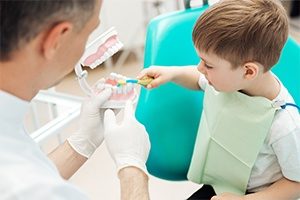I keep getting conflicting information about dental care with children. Though, I shouldn’t ‘be too surprised. I’ve only been a mom for 11 months, but so far every piece of advice or book I’ve read on child rearing has contradicted another piece of advice or book. I can read two different articles and the same action I take will either help my son grow up to be an independent genius or scar him for life. So, now I have to decide about his first dental appointment. He’s been exclusively breast fed and we’re about to start introducing table food to him. I’ve heard two things. 1. Breastfeeding is safer for teeth than formula feeding, therefore they don’t need the one-year-old check-up. 2. Every child, no matter how they’re fed, needs to have the one-year-old check-up to screen for abnormal tooth development. So, what’s your opinion?
Carlyn M.
Dear Carlyn,

You’re right about all the conflicting in formation out there. The one thing you’ll learn throughout your lifetime as a mother is that every child is different. No child fits the norms. Because so much of the information contradicts itself, most of the time you’ll be left with following your mother’s intuition.
One thing that is true is the breastfeeding and bottle feeding have very different effects on teeth. First is the physical differences. While formula tends to pool by children’s teeth, breast milk is sent to the back of the mouth away from their teeth. Secondly, their “ingredients” for lack of a better word are different. We know that breastmilk has properties we haven’t been able to copy in formula. There is mounting evidence that the contents in breastfeeding protect children from cavities.
It would imply that breastfed children do not need to see a pediatric dentist as often. However, as you’ve learned, every child is different.
Reasons for Breastfed Children to See a Pediatric Dentist
- Bacteria Parents with gum disease have higher levels of bacteria. That bacteria is shared through kissing and the sharing of food. As you’re about to introduce table food, that is something to consider.
- Cavities There is always a potential for cavities. Some breastfed babies fall asleep while nursing. Generally, the fact that the milk is sent to the back of their mouth engages their swallowing reflex so no milk pools. However, sometimes the milk flows a bit after the baby stops sucking and can pool at their teeth. There isn’t evidence it does or does not cause cavities yet, but the potential is there, especially if they’re pre-disposed to decay. Which leads me to my next point.
- Genetic Make-up Every family is different. Two people can have the same oral hygiene routine and skill. One will be cavity free, the other will end up with a mouth full of fillings and crowns simply because of their DNA.
- Abnormal Development Your son’s teeth starting developing in the womb. Going right along with genetic issues is the possibility of abnormal development. Whenever you have an abnormality in the development of children’s teeth, it is always easier to treat the earlier it is discovered.
Your Child’s First Pediatric Dental Visit
The first visit isn’t as focused on cavities, though of course that is checked. The dentist will also check their development to make sure no intervention needs to take place. Mostly, though, it’s designed to give your son a positive experience at the dentist and show him how fun it can be.
All too often, parents wait until their son or daughter has a dental emergency pop up before bringing them in. From that moment on, they’ll associate the dentist with pain. Not to mention the more distressing procedures could likely have been avoided altogether if they’d brought them in regularly.
Insurance almost always covers the child’s first visit in full, so it won’t cost you anything but a bit of time.
I hope this helps.
This blog is brought to you by Dr. Don Swearingen.


